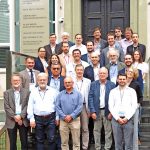Article by Alina Constantin of the IAEA Department of Nuclear Energy orginally posted on the IAEA website.
The IAEA is launching a new Coordinated Research Project (CRP) to assess the various nuclear cogeneration applications and explore why and how countries could consider nuclear cogeneration in their portfolio of options to address the climate challenge. The CRP, entitled ‘Role of Nuclear Cogeneration within the Context of Sustainable Development’, will be conducted over three years.
Nuclear cogeneration, where nuclear power reactors are integrated with other systems and applications to produce not only electricity but also hydrogen, desalination, district heating or industrial process heat, has proven to be an efficient and environmentally attractive option for energy conversion. However, the expertise gained in existing nuclear cogeneration projects has not been easily accessible so far to experts in all countries interested in considering the use of nuclear energy for non-electric applications. This CRP will therefore foster an opportunity to learn from the experience of several countries that have been using nuclear reactors for cogeneration and highlight its benefits.
“Nuclear cogeneration has an enormous potential to contribute to sustainable development while reducing carbon emissions, by taking advantage of the carbon free heat of nuclear power plants to provide fresh water, district heating, process heat and hydrogen,” said Francesco Ganda, Technical Lead for Non‑Electric Applications at the IAEA. “This CRP can contribute to the further development of nuclear cogeneration, and eventually to more versatile and sustainable nuclear energy systems, while also supporting climate goals.”
The CRP will also provide techno-economic examination and investigate competitiveness of various nuclear cogeneration options considering several dimensions, such as technology, economics, environment, including climate change mitigation. It will also assess the challenges in implementing nuclear cogeneration projects, in terms of the business model, licensing, economics and technical aspects, and safety related issues, as well as envisage solutions to address these challenges and enable a faster deployment of nuclear cogeneration projects. The nuclear component will be represented by various technologies, including the existent operating nuclear fleet, small modular reactors and innovative nuclear reactors under development.
Comments are closed.





